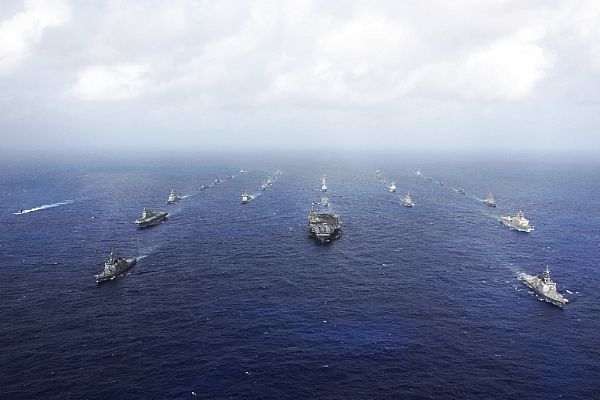
U.S. and Japanese warships train together earlier this month / Navy photo
Todd Purdum takes a big look in the January issue of Vanity Fair at the national-security state through the prisms of Ike Eisenhower – a key player in World War II – and George Kennan – the architect of Washington’s “containment” policy in the Cold War. He finds it a grim, grey place that these American national-security heavyweights wouldn’t recognize.
While Purdum inflates the impact of defense spending on the nation’s ability to get other things done – defense spending continues to shrink, both as a share of the federal budget, and of the nation’s GDP – he squarely captures the mood that has enveloped much of the country, and especially Washington, since 9/11.
Writes Purdum:
…In the years since [Eisenhower], the [nation’s growing militarism] trend has warped virtually every aspect of national life, with consequences that are quite radical in their cumulative effect on the economy, on the vast machinery of official secrecy, on the country’s sense of itself, and on the very nature of national government in Washington. And yet the degree to which America has changed is noticed by almost no one—not in any visceral way. The transformation has taken hold too gradually and over too long a period.
…Kennan reflected on a topic [in 1984] that had become something of an obsession for him by his 80th year: the “extreme militarization not only of our thought but of our lives”—a phenomenon that had had a profoundly distorting effect on the entire economy. Military spending had become a national addiction. “We could not now break ourselves of this habit,” Kennan wrote, “without the most serious of withdrawal symptoms. Millions of people, in addition to those other millions that are in uniform, have become accustomed to deriving their livelihood from the military-industrial complex. Thousands of firms have become dependent on it, not to mention labor unions and communities.”
…the amorphous bogeyman of global terrorism has made the notion of significant adjustments in defense spending off limits.
…It takes only a glance at National Journal or Politico, filled with full-page color advertisements from Lockheed Martin and Raytheon, from Northrup-Grumman and L3 and KBR, to get some indication of where our priorities lie. Great corporate engines once worked to build the U.S. civilian economy and the infrastructure that underlay it; now they are at the service of military power and its projection abroad.
For those of us in and around the nation’s national-security apparatus, this is the key issue of the day: is our globe-girdling military might the optimum way to bring American influence to bear in every nook and cranny of the planet? Just the aspiration that it be so has profound effects: not only on where and how we invest in what we broadly (and somewhat disingenuously) call defense, but how that desire is perceived by everyone else.


